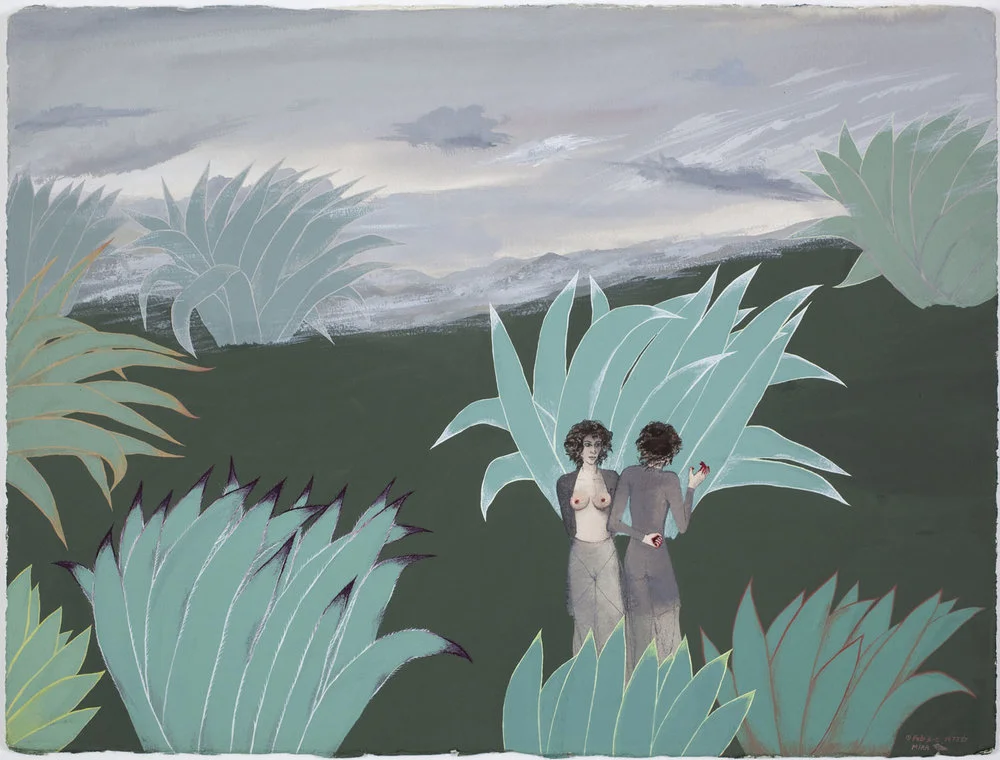Mira Schor
California Paintings, 1971-1973
New York, 106 Forsyth Street
The majority of work has either not been exhibited since 1973 or not at all. Schor’s project, both then and now, is to address issues of gender and experience, setting out as coherently as possible what it means to inhabit a female body and mind. Schor painted the works in the exhibition while an MFA student at CalArts where she participated in the landmark Feminist Art Program created by Judy Chicago and Miriam Schapiro.
Schor's work in the program culminated in Red Moon Room, her painting installation in the legendary Womanhouse exhibition of 1972. Her visionary representations of female subjectivity and desire began in the late 1960s, preceding the publication of Linda Nochlin’s landmark essay, “Why Have There Been No Great Women Artists,” and were painted before artists such as Frida Kahlo and Florine Stettheimer became part of public discourse. Operating in what was then a nascent feminist movement, Schor took encouragement from works as diverse as Northern Renaissance Painting, Rajput painting, Japanese narrative scroll painting, Paul Klee, and from works by contemporary artists such as the Hairy Who.
Schor’s move to Southern California for her graduate studies was transformative. The direction of her life was shaped by the consciousness raising, art historical research, and collaborative focus of the Feminist Art Program. Her work was also deeply affected by the presence of Fluxus artists and poets, the landscape of Southern California with its huge scale, exotic plant life, its atmosphere steeped in cinematic history, and the deceptively casual aesthetic ambiance so generatively distinct from the New York artworld she had grown up in.
Schor's early themes of sexual longing represented through the lens of a feminist critique of power culminated within the spectral landscapes of The Story Paintings (1972-1973). These major gouaches on paper depict the progression of a young woman through sexual adventure and historical awakening. Two triptychs detail Schor’s erotic quest in California landscapes marked by tall, dark cypress trees and the magnificent animistic thorny fronds of agave plants swaying in the breeze. A primal scene indebted to Leonora Carrington, The Bear Triptych shows a young woman in varieties of erotic entanglement with the wild animal. Seen alongside the more dystopic Car Triptych, which features a suspicious automobile placed illogically within the claustrophobic wilds, these two series find the young artist creating the mythology of her moment. The eroticism represented by the young woman traversing these beautiful and perilous fields was real, but painting it, that is, speaking it, was a central concern of the artist. The narrative structure of The Story Paintings updated the hero’s journey to include the sexual politics of the feminist era. The heroine was on another quest altogether—the erotic impulse is sublimated to the level of language and artmaking. The Two Miras is an enduring representation of that duality, one patterned off the classical divide between the Apollonian and the Dionysian. In the last of her California works, Schor shattered the representational and narrative frame, detonating a mix of language, symbols, and painterly gesture, as if the consummation of sexual desire had liberated her engagement with the pictorial field. These works marked the first instance of Schor’s long engagement with language as image.






